They grew up watching the world shift from analog to digital, and today, their smartphones are the gateway to everything from shopping and streaming to social connection and brand engagement. At Acorn Marketing, we specialize in helping businesses reach Millennials where they are—with messaging that resonates, platforms that perform, and experiences that drive action. Whether you’re launching a new product, revamping your brand, or building loyalty through digital touchpoints, understanding what moves Millennials is key. In this blog, we’ll walk you through the strategies we use to help our clients build authentic, lasting relationships with this influential generation.

Millennials are Loyal to Brands and Retailers They Trust
Millennials value brands they believe they can trust and those that deliver easy, positive experiences. Their loyalty is shown through repeat purchases and enthusiastic word-of-mouth recommendations to friends, family, and coworkers. Brand reputation matters to this group. For example, 38% of Millennials will go straight to a trusted brand when shopping for new financial products or services, compared to only 26.3% who prefer to shop around.1
Additionally, a study by the National Retail Federation (NRF) focused on millennial parents found that 64% of millennial parents shop loyal brands first, before even looking at competitors. 10% higher than other age groups.
Mobile-First Expectations
Marketing to Millennials requires impressions on multiple platforms and optimized for mobile consumption. Additionally, it needs to capture their attention immediately with a strong approach to hold their attention for a couple of seconds. Informative content that is both interactive and allows for quick consumption is the most effective way to reach millennials. Direct engagement through comments, messages and replies, polls, etc… are great ways to do this. If a brand does not have a user-friendly website, Millennials are quick to move on to a competitor with one that is more engaging and easier to use. Additionally, membership programs and exclusive discounts are extremely useful in building loyalty with Millennials. Techniques such as limited drops, early access, or branded events draw Millennials in and make them feel connected with the brand. Generation Y does not want to miss out on these things, so they make purchases easily.
Where Millennials Spend Time—and Money
Millennials are active on social platforms, often using them to research products and services. Content Science Review reports that Millennials spend an average of 2.25 hours per day on social platforms and a staggering 253 minutes per day on their smartphones.2
By spending considerable time on mobile apps like Facebook, Instagram, YouTube, TikTok, Snapchat, and Pinterest, they enjoy staying informed and entertained.
Most Used Social Media Apps by Millennials3
|
Platform |
% Millennials Using |
Key Behavior |
|---|---|---|
| YouTube | 94% | Longform video consumption |
| 78% | Personal updates & group use | |
| 66% | Brand engagement & stories | |
| TikTok | 40% | Shortform trends & entertainment |
| 41% | Professional networking | |
| 43% | Project planning, product discovery | |
| Snapchat | 32% | Video sharing, chats & updates |
Frictionless Transactions Are Key
Millennials tend to make impulsive purchases online—clothing, groceries, takeout—preferring streamlined checkout processes with minimal clicks. Digital tools make it simple, and this generation is willing to spend more for tools that save time and simplify life. The more that can be done through their mobile device, the better. They enjoy a “one-stop shop” experience that allows for quick purchases and fast delivery, that support their spending habits on travel, education, clothing, services, food, and social events. Services like Shipt, Instacart, and UberEATS have become essentials, not luxuries, as Millennials have eagerly embraced transactions such as Venmo, Apple Pay, and Zelle.
The Rise of Engagement Through Podcasts
Podcasts are another form of media actively consumed by Millennials and a great opportunity for brand marketing. They can listen to them on the go, at home, and at work. They are interested in interviews about relevant people in society or in their field of work. Whether it be celebrities, industry leaders, or experts, Millennials often listen while completing another task. Listening to podcasts makes Millennials feel personally connected to the host because it is often more genuine than other forms of social media. Roughly half of U.S. adults say they have listened to a podcast in the past year, according to a new Pew Research Center survey, including one-in-five who report listening to podcasts at least a few times a week. Among adults under 30, about a third listen to podcasts with such frequency.4
Authenticity Matters
Marketers hoping to connect with Millennials must be open and authentic. They like brands with a compelling story or values that align with themselves. They engage with brands that use micro-influencers, as they follow them closely and trust them. They look carefully at reviews and photos of products online rather than trusting advertisements. Relatable content is what sells to Millennials. Humor and storytelling through online platforms make it engaging and memorable, especially when delivered through short, powerful video content.
Millennials are also highly motivated by brands that demonstrate a genuine commitment to social responsibility and inclusivity. They pay close attention to how companies treat their employees, support their communities, and address important issues such as sustainability and diversity. For this generation, purchasing decisions often go beyond price or convenience—they want to align with brands they can trust and those whose values reflect their own. By communicating your brand’s purpose, ethical standards, and positive impact, you can cultivate a deeper sense of trust and loyalty among Millennial consumers.
Millennial Entrepreneurship and the Side Hustle Mindset
Beyond traditional employment, Millennials are driving a surge in entrepreneurship and side hustles, leveraging digital platforms to create new income streams and express their creativity. Whether launching e-commerce shops, offering freelance services, or building personal brands as influencers on social media, Millennials are redefining what it means to work and earn. This entrepreneurial mindset is fueled by both necessity and opportunity: economic uncertainty has encouraged Millennials to seek financial independence, while technology has lowered barriers to entry for starting a business. Brands that support this spirit—by providing tools, resources, or communities that help Millennials grow their ventures—can build strong, lasting relationships with this innovative and ambitious generation.

Reaching Millennials effectively means embracing a fast-moving, digital-first mindset grounded in authenticity, convenience, and real value. Millennials expect brands to show up where they spend their time—on mobile devices, across social media, and through content that captures their interest and feels relevant. They gravitate toward brands that align with their values, make life easier, and offer a smooth, hassle-free buying experience. At Acorn Marketing, we specialize in helping businesses decode Millennial behavior and use those insights to craft campaigns that inspire action and long-term loyalty.
- Develop mobile-first strategies that prioritize fast, seamless user experiences.
- Create engaging social content and ads tailored to platforms like Instagram and Facebook.
- Leverage user-generated content to build trust and relatability.
- Design frictionless paths to purchase, from digital ads to one-click checkout and contactless payment.
Marketing to Millennials isn’t about keeping up—it’s about staying ahead. Let Acorn Marketing help you design authentic, strategic campaigns that reach Millennials where they are and move them toward your desired outcomes.
While it’s rare that a brand is aiming to reach consumers who are all of a single generation, and there’s more to targeting than simply understanding your audience’s age or stage of life, it’s all helpful when building out a marketing plan.
Take a look at the other blogs in our Marketing to Different Generations Blog Series below:

Sources:
1. Meaghan Yuen, “Guide: Marketing to Millennials,” EMARKETER, November 9, 2024.
2. Content Science, “Millennial Content Consumption Fact Sheet,” Content Science Review, January 2, 2025.
3. Sprout Social, “Social media demographics to inform your 2025 strategy,” February 24, 2025.
4. Elisa Shearer, “Podcasts as a Source of News and Information,” Pew Research Center, April 18, 2023.





